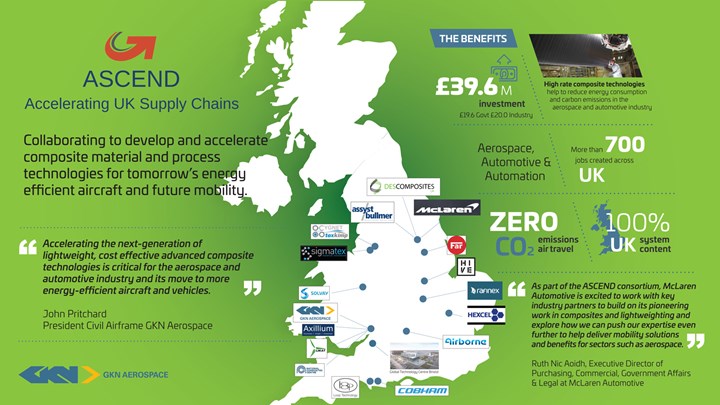GKN Aerospace and partners launch ASCEND to accelerate high-volume composite technologies
£39.6 million ASCEND consortium to strengthen the U.K. industry’s position as the leader of next-generation sustainable aircraft and future mobility technology.

Photo Credit: GKN Aerospace
It was announced on March 12 that GKN Aerospace (Solihull, U.K.) is leading a new U.K. industry consortium called ASCEND (Aerospace and Automotive Supply Chain Enabled Development) to develop and accelerate composite material and process technologies for the next generation of energy efficient aircraft and future mobility.
The £40 million consortium, funded by a £20 million commitment from industry and a £19.6 million commitment from the UK Government via the Aerospace Technology Institute (ATI), will focus on greater adoption of composite technologies, the industrialization of new technologies, as well as accelerating aerospace production rates to meet future high-volume requirements. This includes the development of advanced material and automation equipment technologies across the U.K. supply chain to manufacture lightweight structures for the sustainable air mobility, aerospace and automotive industries.
U.K.-based Assyst Bullmer (Wakefield), Cobham Mission Systems (Wimborne), Cygnet Texkimp (Northwich), FAR-UK Ltd. (West Bridgford), Hexcel Composites (Cambridge), Hive Composites (Leicestershire), LMAT, Loop Technology (Dorchester), McLaren Automotive (Woking), the National Composites Centre (NCC, Bristol), Rafinex (London), Sigmatex (Chesire), Solvay Composite Materials, as well as Airborne (Lambourn) and Des Composites (Sheffield) will join GKN Aerospace in the consortium with collaboration and investment support from Axillium Research. With a three-year commitment, the partnership, backed by the U.K. government, will bring together expertise, capabilities and resources from across the wider U.K. aerospace and automotive supply chain. In doing so, ASCEND will reportedly strengthen the U.K.’s position as a technology leader in future lightweight structures and help to reduce energy consumption and carbon emissions in the aerospace and automotive industry.
The consortium will be led from GKN Aerospace’s £32-million Global Technology Centre in Bristol and will support up to 130 jobs through 2023/24. GKN Aerospace says it will use its long-term experience and in-depth knowledge of composite engineering for integrated airframe structures throughout the project.
“GKN Aerospace has deep knowledge and expertise in composites technology and we are proud to lead this consortium,” says John Pritchard, president Civil Airframe GKN Aerospace. “Accelerating the next generation of lightweight, cost-effective advanced composite technologies is critical for the aerospace and automotive industry and its move to more energy-efficient aircraft and vehicles. Ensuring we can not only develop these technologies, but also manufacture them at high-rate across the U.K. supply chain, will maintain our position as an industry leader and underpin our commitment to sustainability. Combined with ATI, which is providing vital support for the U.K.’s position on the next generation of aircraft, we will be able to deliver breakthroughs in technology as well as benchmark levels of price, quality and repeatability.”
Related Content
-
CirculinQ: Glass fiber, recycled plastic turn paving into climate solutions
Durable, modular paving system from recycled composite filters, collects, infiltrates stormwater to reduce flooding and recharge local aquifers.
-
Hexagon Purus Westminster: Experience, growth, new developments in hydrogen storage
Hexagon Purus scales production of Type 4 composite tanks, discusses growth, recyclability, sensors and carbon fiber supply and sustainability.
-
Composites end markets: Electronics (2024)
Increasingly, prototype and production-ready smart devices featuring thermoplastic composite cases and other components provide lightweight, optimized sustainable alternatives to metal.
















